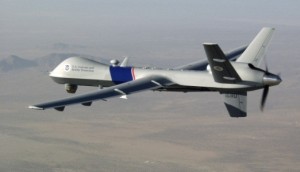 TEHRAN, Oct. 23 (MNA) � Human rights groups on Tuesday accused the United States of breaking international law and perhaps committing war crimes by killing civilians in missile and drone strikes that were intended to hit militants in Pakistan and Yemen.
TEHRAN, Oct. 23 (MNA) � Human rights groups on Tuesday accused the United States of breaking international law and perhaps committing war crimes by killing civilians in missile and drone strikes that were intended to hit militants in Pakistan and Yemen.Amnesty International and Human Rights Watch released separate reports detailing the deaths of dozens of civilians in the two countries. They urged the Obama administration and Congress to investigate, and end a policy of secrecy on the attacks.
"In some of the cases we looked at ... they appear to be war crimes, but really the full picture is for the U.S. authorities to reveal," Mustafa Qadri, Pakistan researcher at Amnesty International, said after describing the death of a 68-year-old Pakistani grandmother in an alleged drone strike. "We are saying for the U.S. authorities to come clean," he said at a joint news conference with Human Rights Watch.
Responding to the reports, White House spokesman Jay Carney said Obama administration officials "take the matter of civilian casualties enormously seriously." He said he could not speak to specific operations, but that U.S. policies met international and domestic legal obligations and the standard of "near certainty" that civilians would not be hit.
U.S. officials have argued that any drone strikes are very carefully targeted and that civilian casualties have been kept to a bare minimum, possibly in the low dozens. Letta Tayler of Human Rights Watch said her organization had found violations of international law when civilians were "indiscriminately" killed in Yemen.
In a September 2, 2012, attack, the target - an alleged al Qaeda militant, Abd al-Raouf al-Dahab, - was "nowhere in sight" when the United States hit a passenger van and killed 12 people returning from the market, she said. "Their loved ones found their charred bodies in pieces on the roadside, dusted in flour and sugar that they were bringing home to their families," Tayler told reporters.
Both the Amnesty International and Human Rights Watch reports looked at handful of U.S. attacks in Pakistan and Yemen to urge transparency and accountability in U.S. policy. U.S. drone strikes in Pakistan and Yemen increased dramatically after President Barack Obama took office in 2009, and the pilotless aerial vehicles became a key part of the fight against al Qaeda. More recently the number of strikes has slowed.
The United States has also used drones over Afghanistan, Somalia, Libya, and Iraq, and this year received approval to base drones in Niger. Obama discussed drone strikes in a speech on counterterrorism policy last May, when he also signed a document codifying guidelines for the use of force against terrorists. He said that before drone strikes were taken, there must be near-certainty that no civilians would be killed or wounded.
Earlier this month, Pakistan told the United Nations that of some 2,200 people killed by drone strikes in the past decade, at least 400 were civilians, a U.N. human rights investigator said. The United States has not followed its own guidelines, even striking in cases where the targets were not present, or when it would have been easy to capture targets instead of killing them, the human rights advocates said.
Pakistan's Prime Minister Nawaz Sharif, visiting Washington, said drones had deeply disturbed Pakistan's people. "This issue has become a major deterrent in our bilateral relationship as well. I would therefore stress the need for an end to drone attacks," Sharif said.
Pakistan's North Waziristan is the area of the most intensive U.S. drone campaign in the world. Qadri, Amnesty's researcher, said he was concerned that Pakistani authorities may be complicit in the strikes, but that he had no concrete evidence of this.
Amnesty's 74-page report said it had researched nine strikes in North Waziristan. The Pakistani grandmother, Mamana Bibi, was killed last October in one strike and several of her grandchildren were wounded; 18 civilian laborers died in another strike in July, the report said.
Human Rights Watch's 96-page report described six "unacknowledged" U.S. military attacks on targets in Yemen, one in 2009 and the others in 2012-2013. Eighty-two people, 57 of whom were civilians, were killed, it said.
In December 17, 2009, an attack by as many as five U.S. Navy cruise missiles struck a Yemeni hamlet. Human Rights Watch said that although 14 fighters for al Qaeda's Yemeni affiliate were killed in the attack, so were at least 41 civilians.
By Mehr News Agency
The Iran Project is not responsible for the content of quoted articles.










